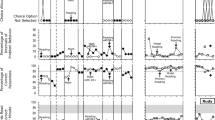Abstract
Subjects were 30 fourth grade children with average intellectual ability but reading achievement at least 1.5 years below grade level. Each child was given two word-recognition lists, the first one as a pretest and the second list under one of three different experimental conditions: control, positive reinforcement (1 nickel for each word read correctly), and response cost (1 of 40 nickels taken back for each word read incorrectly). Relative to the control condition, positive reinforcement led to a significant increase in response latency but no change in errors, while response cost led to both a significant increase in latency and a significant decrease in reading errors. The entire group was found to be impulsive on the Matching Familiar Figures test. The successful reduction in impulsive reading errors was interpreted as support for Kagan's hypothesis that the impulsive child evidences low concern about errors on such academic tasks.
Similar content being viewed by others
References
Block, J., Block, J. H., & Harrington, O. M. Some misgivings about the Matching Familiar Figures Test as a measure of reflection-impulsivity.Developmental Psychology, 1974,10, 611–632.
Dunn, L. M.Expanded manual: Peabody Picture Vocabulary Test. Minneapolis: American Guidance Service, 1965.
Dunn, L. M., & Markwardt, F. C.Peabody Individual Achievement Test manual. Minneapolis: American Guidance Service, 1970.
Egeland, B. Training impulsive children in the use of more efficient scanning techniques.Child Development, 1974,45, 165–171.
Erickson, L., & Otto, W. Effect of intra-list similarity and impulsivity on kindergarten children's word recognition performance.Journal of Educational Research, 1973,66, 466–470.
Errickson, E. A., Wyne, M. D., & Routh, D. K. A response-cost procedure for reduction of impulsive behavior of academically handicapped children.Journal of Abnormal Child Psychology, 1973,1, 350–357.
Iwata, B. A., & Bailey, J. S. Reward versus cost token systems: An analysis of the effects on students and teacher.Journal of Applied Behavior Analysis, 1974,7, 567–576.
Kagan, J. Reflection-impulsivity and reading ability in primary grade children.Child Development, 1965,36, 609–628.
Kagan, J. Reflection-impulsivity: The generality and dynamics of conceptual tempo.Journal of Abnormal Psychology, 1966,71, 17–24.
Kagan, J., & Messer, S. B. A reply to “Some misgivings about the Matching Familiar Figures Test as a measure of reflection-impulsivity.”Developmental Psychology, 1975,11, 244–248.
Kagan, J, Rosman, B. L., Day, D., Albert, J., & Phillips, W. Information processing in the child: Significance of analytic and reflective attitudes.Psychological Monographs, 1964,78 (Whole No. 578).
Kaufman, K. F., & O'Leary, K. D. Reward, cost, and self-evaluation procedures for disruptive adolescents in a psychiatric hospital school.Journal of Applied Behavior Analysis, 1972,5, 293–309.
Massari, D. J., & Schack, M. L. Discrimination learning by reflective and impulsive children as a function of reinforcement schedule.Developmental Psychology, 1972,6, 183.
Messer, S. The effect of anxiety over intellectual performance on reflection-impulsivity in children.Child Development, 1970,41, 723–735.
Nelson, W. M., III, Finch, A. J., & Hooke, J. F. Effects of reinforcement and response-cost on cognitive style in emotionally disturbed boys.Journal of Abnormal Psychology, 1975,84, 426–428.
Slosson, R. L.Slosson Oral Reading Test. East Aurora, New York: Slosson Educational Publications, 1963.
Ward, W. C. Reflection-impulsivity in kindergarten children.Child Development, 1968,39, 867–874.
Weiner, H. Some effects of response cost upon human operant behavior.Journal of the Experimental Analysis of Behavior, 1962,5, 201–208.
Weiner, H. Response cost and the aversive control of human operant behavior.Journal of the Experimental Analysis of Behavior, 1963,6, 415–421.
Author information
Authors and Affiliations
Additional information
This report is based on a senior honors thesis by D. E. B., which was the 1977 winner of the Dashiell-Thurstone Prize for the best undergraduate honors thesis in psychology at the University of North Carolina at Chapel Hill Appreciation is expressed to the following persons for their assistance or comments: Dr. W. Anderson, Ms. D. Crew, Ms. C. Earp, Ms. N. Hardy, Dr. K. Jens, Dr. K. Fleishman, Dr. B. Martin, Dr. G. Mesibov, Mr. S. Muller, Ms. E. Pritchett, Mr. Wall, Ms. Wall, and Ms. M. Walton. The research was supported in part by U. S. Public Health Service, Maternal and Child Health Project No. 916, and by Grants HD-03110 and ES-01104 from the National Institutes of Health.
Rights and permissions
About this article
Cite this article
Brent, D.E., Routh, D.K. Response cost and impulsive word recognition errors in reading-disabled children. J Abnorm Child Psychol 6, 211–219 (1978). https://doi.org/10.1007/BF00919126
Revised:
Issue Date:
DOI: https://doi.org/10.1007/BF00919126




